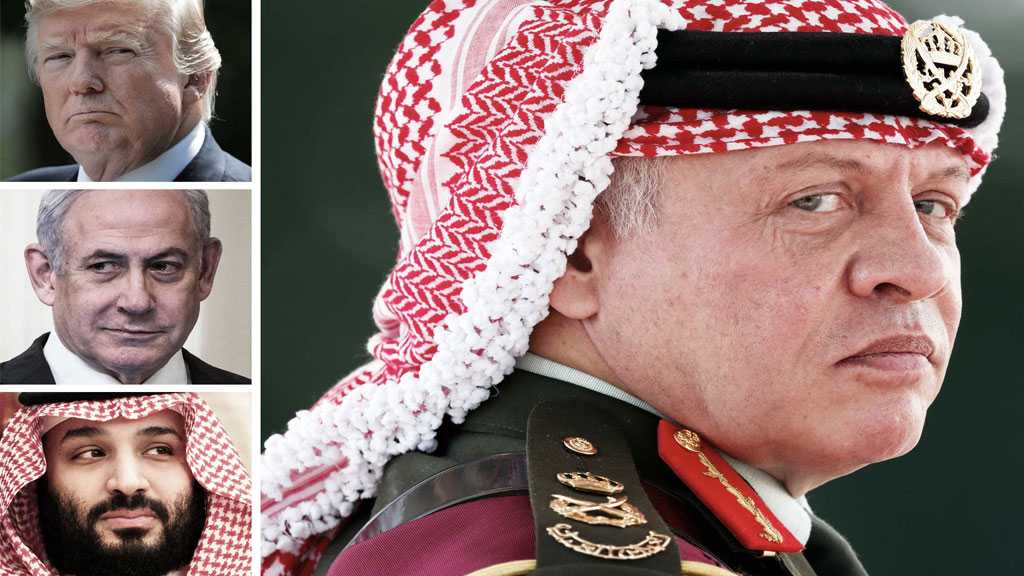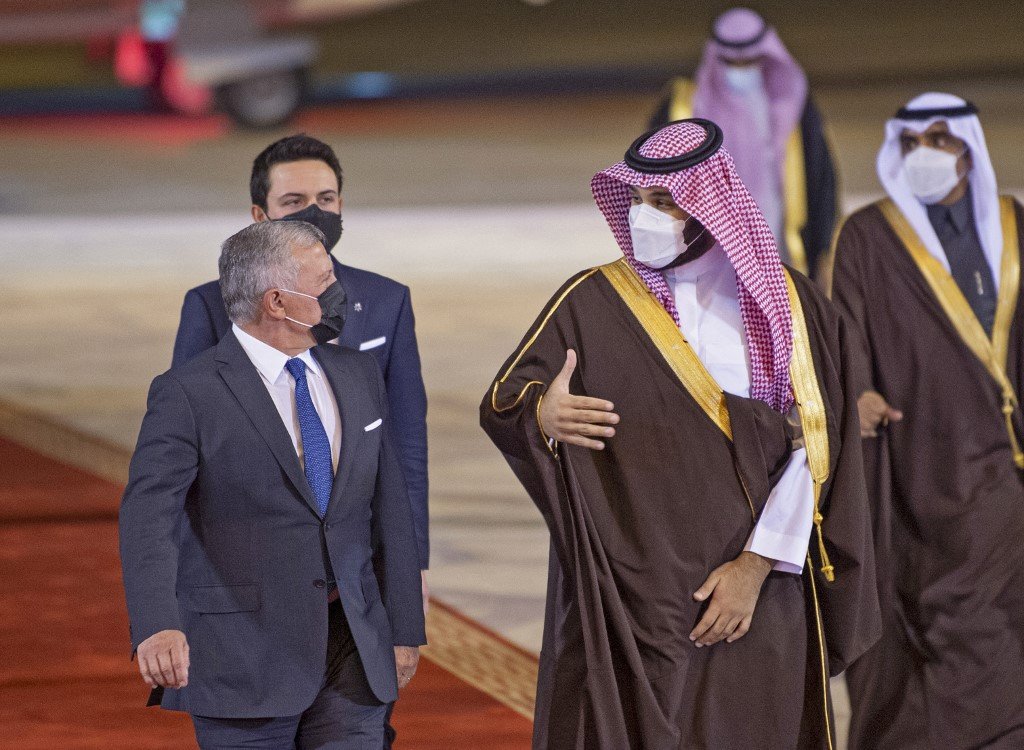Support for the Palestinian cause, at an all-time high globally, is being actively suppressed by Jordanian authorities, under pressure to keep a lid on anti-Israel displays in the kingdom.
For the past fortnight, thousands of Jordanians have taken to the streets of Amman, besieging the Israeli embassy, condemning the Gaza genocide, demanding the Hashemite Kingdom sever all ties with Tel Aviv – and, in particular, tearing up the country’s 1994 peace treaty with Israel.
Jordanian security forces have met these protests with increasing severity, signaling the government’s unease with too much public criticism of Israel. Amidst the turmoil, Saudi Arabia – Jordan’s biggest Arab patron – watches warily, concerned that a surge in Palestinian solidarity might challenge its own regional dominance and sink all prospects of Riyadh’s normalization with Tel Aviv.
Banning ‘Palestine’
This includes banning Palestinian flags, keffiyehs, and banners from protests – a mirror of the restrictions imposed in several pro-US Arab states. Attendees are also subjected to invasive body searches and identification checks, and select individuals are barred from participating.
The crackdowns seem to change by the day – one day, protesters are seen with their keffiyehs, and the next, they are not. The same goes for Palestinian flags. At times, they are visible in the throngs; with the flip of a switch, protesters resort to flashing the flag only on their mobile phones.
The public demonstrations are mainly confined to the heavily barricaded courtyard of Kaluti Mosque, situated near Amman’s evacuated Israeli embassy, and restricted to a duration of only two hours.
During the month of Ramadan, protests commence at 10 PM, following the conclusion of mass Taraweeh prayers. As one protester relates to The Cradle:
Police insist it needs to be over by midnight, then break it off violently or through intimidation if people refuse to leave. Greater restrictions are a huge deterrent to attending, especially having to show your ID – people worry it’ll somehow be used against them later. Due to the barriers, some people often can’t even get in, and those who do can’t move. It’s meant to demoralize us, trapping us in a cage and preventing us from breaking out into the streets.
The banning of Palestine’s flag is an especially sensitive escalation by Jordanian authorities. A small majority of the Jordanian population is Palestinian by birth. They consist of refugees from Palestine and their descendants, as well as residents of the West Bank during the period of Amman’s administration from 1948 to 1967.
As there is no census in the country, the precise figure is unknown. This may be by design, in order to diminish Palestine’s societal and political influence in the British-created Hashemite Kingdom.
A symbolic struggle intensifies
In a hugely symbolic development, violence towards Palestine solidarity protesters in Amman reached its zenith on 30 March, Land Day, which commemorates a fateful date in 1976 when Zionist authorities first began formally confiscating Palestinian territory for settlement.
Six unarmed Palestinians – including three women – were murdered that day by Israeli occupation forces, with hundreds more injured during subsequent clashes. Ever since then, Jordanian officials have attempted to calm the situation and present themselves as committed anti-Zionists.
In their response to the past week of protests, authorities in Amman have tried to strike a quiet balance. Government Communications Minister Muhannad Mubaidin has claimed that condemning Israel is a core national ethos, affirming Amman’s solidarity with Palestine and the citizens’ right to protest despite “violations” committed by a minority of demonstrators.
Yet, as one anonymous Jordanian activist tells The Cradle, “many of us think this is just talk.” After all, many protesters arrested over the past two weeks remain in “administrative detention,” and formal restrictions on the protests have only ratcheted since 30 March.
The X account of the “Jordanian Youth Gathering for the Support of the Resistance” lists the names and photographs of 54 protesters they allege are currently being detained by Jordanian security forces. For supporting Palestine, they remain behind bars during the official Muslim Eid al-Fitr holiday that marks the end of the holy month of Ramadan.
Jordan’s Palestinian identity crisis
In September 1970, in response to the Palestine Liberation Organization (PLO) using Jordan as a highly effective staging ground for strikes upon the occupation state, Jordanian forces began attacking cities, including Amman, with a substantial fedayeen presence.
Commonly known as Black September, events that month spiraled into what was effectively a civil war, with Palestinians and Jordanians on both sides of the divide. Several protesters who spoke to The Cradle note the obvious parallels between then and now, with one saying banning symbols of Palestine solidarity “seems insane,” given the historical context of such actions in Amman.
Activists also say that accusations against Palestine solidarity protesters in Jordan of serving “foreign agendas” and being directed by overseas actors have reached unprecedented levels.
Although blaming the ‘Other’ is an age-old tactic of authorities to dispel dissent among populations, several activists tell The Cradle it has reached “shocking” and unprecedented levels this time round. The cast of characters who stand accused include the Muslim Brotherhood, Iran, Hamas, and even the west.
Despite these accusations, the protests have a genuine international component, fostering a spirit of unity among Palestine solidarity activists across West Asia, including Egypt, Jordan, Morocco, and Oman.
“People in Cairo were chanting against [Jordan’s King] Abdullah II a few days ago, while we chanted against [Egyptian President Abdel Fattah] al-Sisi. We call on each other to rise!” a Jordanian protester proudly tells The Cradle. Such scenes are absolute anathema to various governments within and outside West Asia.
Israel’s counterstrategy
This growing Arab solidarity with Palestine has not gone unnoticed by Israel, which is acutely aware of the horrendous reputational impact its Gaza genocide is having overseas. A leaked US State Department memo has revealed Tel Aviv is recruiting “influencers to help target social media users” in Europe and North America, and “Egypt, Jordan, and Gulf Arab countries” to highlight purported Hamas atrocities.
Accordingly, open-source investigation platform EekadFacts has exposed a number of X accounts, reportedly based in Jordan, posting relentless anti-Hamas messaging.
These cloak-and-dagger activities have done nothing to quell Palestine solidarity in any corner of the world and have thrown pro-US Arab allies, particularly Saudi Arabia, for a loop.
Riyadh’s role
As Lebanese daily Al-Akhbar forcefully noted on 4 April, Riyadh has “launched its press and electronic flies to defend the Hashemite throne” – ironic, given that in 2021, Crown Prince Mohammed bin Salman (MbS) attempted to overthrow King Abdullah II and install his brother, Prince Hamzah, as regent. The coup plotters, it should be noted, remain on trial in Amman today.
A largely forgotten component of that failed putsch was Israel’s central involvement. As Al-Akhbar observed, Bin Salman is desperate to crush Palestine solidarity, for such activity interferes with his long-term “ambition to normalize relations with Israel, as a way to obtain American guarantees for the security and safety of the Saudi regime.”
This includes US acquiescence to the sale of F-35 fighter jets to Riyadh and US assistance in establishing nuclear infrastructure that includes a nuclear fuel circuit on Saudi territory – both longtime Saudi demands.
Riyadh and Tel Aviv were on the verge of normalizing relations when Operation Al-Aqsa Flood struck, followed by the brutal assault on Gaza.
Israel’s military blitzkrieg made normalization an untenable proposition. While initially, MbS suggested it was off the table, this was clearly an expedient fudge to uphold his claim that the kingdom “represents the heart of the Muslim world” and “senses the hopes and pains of Muslims everywhere, strives to achieve unity, cooperation and solidarity in our Muslim world.”
By January, he had reversed course, openly and repeatedly expressing “interest” in “recognition” of Tel Aviv – provided Israel agrees to advance the two-state solution and build a “renewed” Palestinian Authority that can, presumably, garner the support of actual Palestinians.
Concurrently, Riyadh has been meeting with representatives of Egypt, Jordan, Qatar, and UAE to hammer out a “joint plan” for Gaza, post-war. It would see the brutal, collaborationist, British-trained Palestinian Authority take over as the territory’s undisputed ruler, with Hamas frozen out of all official offices and agencies.
It is a proposition neither Palestinian freedom fighters nor Palestine solidarity activists the world over are likely to accept.
Filed under: "Israel", Jordan, Palestine, Saudi Arabia, USA | Tagged: "Israel", Hamas Resistance movement, High treason normalization, Israeli Occupation Force IOF, Jordan, King Abdullah II, Mohammed Bin Salman (MBS), Normalisation is betrayal, Occupied W Bank, Palestinian cause, Palestinian Liberation Movement PLO, Prince Hamzah | Comments Off on Why is Jordan cracking down on support for Gaza?













